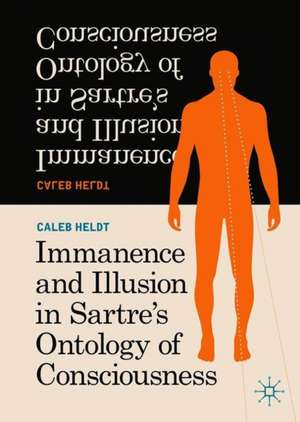Immanence and Illusion in Sartre’s Ontology of Consciousness
Autor Caleb Heldten Limba Engleză Hardback – aug 2020
As the foundation upon which the rest of Sartre’s philosophical project is built, it is essential that the phenomenological ontology of Sartre’s early writings be interpreted with clarity. This book provides such a reinterpretation. In doing so, a philosophical inquiry emerges which is genuinely contemporary in its aim and scope and which seeks to demonstrate the significance of Sartre’s thought, not only as significant to the history of philosophy, but to ongoing debates in continental philosophy and philosophy of mind.
| Toate formatele și edițiile | Preț | Express |
|---|---|---|
| Paperback (1) | 383.71 lei 6-8 săpt. | |
| Springer International Publishing – 2 aug 2021 | 383.71 lei 6-8 săpt. | |
| Hardback (1) | 388.72 lei 6-8 săpt. | |
| Springer International Publishing – aug 2020 | 388.72 lei 6-8 săpt. |
Preț: 388.72 lei
Nou
Puncte Express: 583
Preț estimativ în valută:
74.38€ • 77.67$ • 61.42£
74.38€ • 77.67$ • 61.42£
Carte tipărită la comandă
Livrare economică 15-29 aprilie
Preluare comenzi: 021 569.72.76
Specificații
ISBN-13: 9783030495510
ISBN-10: 3030495515
Pagini: 193
Ilustrații: XL, 195 p.
Dimensiuni: 148 x 210 mm
Greutate: 0.43 kg
Ediția:1st ed. 2020
Editura: Springer International Publishing
Colecția Palgrave Macmillan
Locul publicării:Cham, Switzerland
ISBN-10: 3030495515
Pagini: 193
Ilustrații: XL, 195 p.
Dimensiuni: 148 x 210 mm
Greutate: 0.43 kg
Ediția:1st ed. 2020
Editura: Springer International Publishing
Colecția Palgrave Macmillan
Locul publicării:Cham, Switzerland
Cuprins
1. Being, Nothingness, and Becoming.- 2. Pre-Reflective Consciousness and (Non-)Thetic Awareness.- 3. Transcendent (Non-)Thetic Awareness.- 4. Time-Consciousness: Physic and Transcendental.- 5. From Temporality to Wordly and Psychic Spatiality.- 6. From the Ontological to the Psychological: Memorial Totalization, Illusory Immanence and Transcendental Potentitality.
Notă biografică
Caleb Heldt is an independent scholar based in Colorado, USA. Earning his PhD in philosophy at the University of Warwick, he undertook research as an international scholar at the Institute of Philosophy at the Katholieke Universiteit Leuven, Belgium. His research interests lie in post-Kantian European philosophy as well as existential philosophy and phenomenology.
Textul de pe ultima copertă
This book is a critical re-evaluation of Jean-Paul Sartre’s phenomenological ontology, in which a theory of egological complicity and self-deception informing his later better known theory of bad faith is developed. This novel reinterpretation offers a systematic challenge to orthodox apprehensions of Sartre’s conceputualization of transcendental consciousness and the role that the ego plays within his account of pre-reflective consciousness. Heldt persuasively demonstrates how an adequate comprehension of Sartre’s theories of negation and reflection can reveal the world as it appears to human consciousness as one in which our reality is capable of becoming littered with illusions.
As the foundation upon which the rest of Sartre’s philosophical project is built, it is essential that the phenomenological ontology of Sartre’s early writings be interpreted with clarity. This book provides such a reinterpretation. In doing so, a philosophical inquiry emerges which is genuinely contemporary in its aim and scope and which seeks to demonstrate the significance of Sartre’s thought, not only as significant to the history of philosophy, but to ongoing debates in continental philosophy and philosophy of mind.
As the foundation upon which the rest of Sartre’s philosophical project is built, it is essential that the phenomenological ontology of Sartre’s early writings be interpreted with clarity. This book provides such a reinterpretation. In doing so, a philosophical inquiry emerges which is genuinely contemporary in its aim and scope and which seeks to demonstrate the significance of Sartre’s thought, not only as significant to the history of philosophy, but to ongoing debates in continental philosophy and philosophy of mind.
Caracteristici
Evaluates afresh the phenomenological ontology of Jean-Paul Sartre’s early writings Challenges the orthodox apprehension of Sartre’s conceptualization of transcendental consciousness Offers a novel reinterpretation of Sartre’s phenomenological ontology
